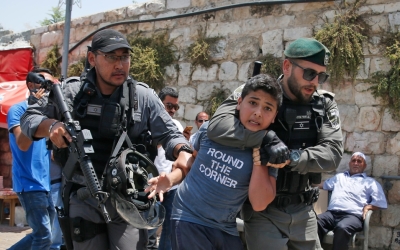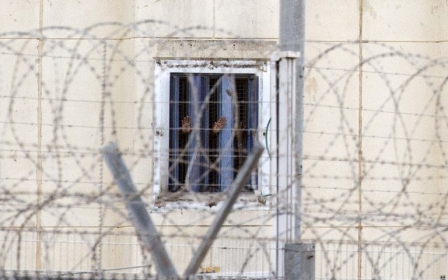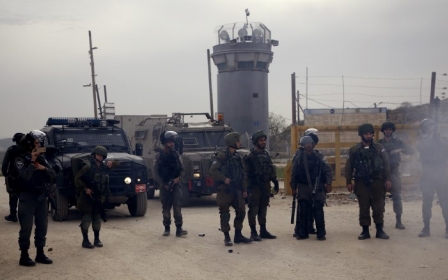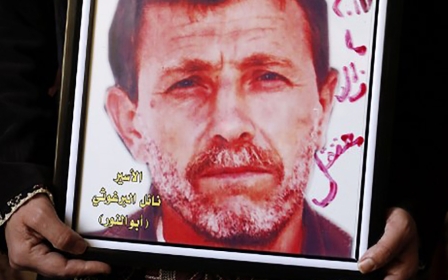Jamming devices and violent raids: Palestinians face new battle in Israeli prisons
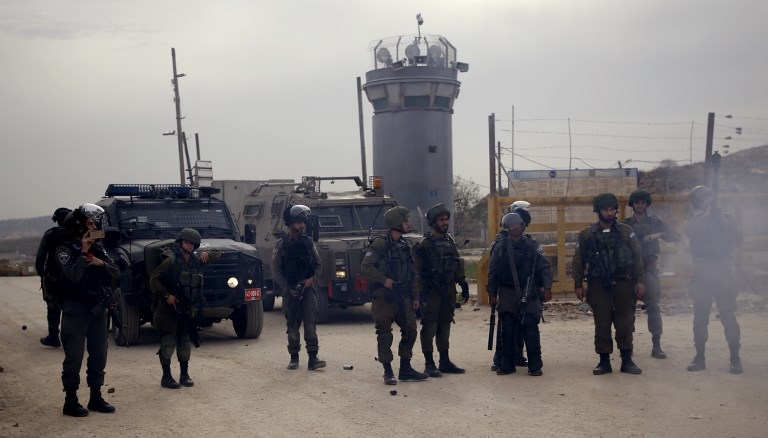
The family of Palestinian prisoner Islam Weshahi is in a constant state of distress.
For the past few days, they have been receiving conflicting information about their 36-year-old son’s health. Some reports said he had died, while others said he remains alive but is seriously wounded.
Weshahi has been behind bars since 2002, serving a sentence of 19 years on charges of belonging to the armed wing of Hamas, the Izz al-Din al-Qassam Brigades.
On Sunday, Israeli prison guards fired a bullet at him from point-blank range in Section Four of the Ketziot prison in the Naqab region, known in Hebrew as the Negev.
The Israel Prison Service (IPS) has accused Weshahi and another Palestinian prisoner, Adi Salem, of stabbing two prison guards using sharp makeshift tools. One of the guards was slightly injured and the other is in a moderate condition.
New MEE newsletter: Jerusalem Dispatch
Sign up to get the latest insights and analysis on Israel-Palestine, alongside Turkey Unpacked and other MEE newsletters
In the past week, Israeli forces have launched a large-scale campaign of suppression against Section Four, firing dozens of tear gas bombs and severely beating prisoners.
According to rights groups, some 20 prisoners have been injured, including seven who were hospitalised and three whose wounds have been described as serious.
Local rights groups have called on the International Committee of the Red Cross (ICRC) to intervene and ensure protection of prisoner rights, including the right to life and health.
The developments come in the context of increased tensions at the Naqab prison over the past month. According to Palestinian prisoners’ rights sources, some 22 Palestinians held in the prison were fined by the prison service on Wednesday and banned from family visits in the wake of the latest raid.
On Tuesday, Palestinians took to the streets in both the occupied West Bank and Israel to denounce incarceration conditions, while prisoners are planning a hunger strike starting on 7 April - leading many to believe the issue of Palestinian prisoners detained by Israeli authorities could once again come to the fore.
Tear gas, bullets, dogs and batons
In February, Israeli authorities placed cell signal jamming devices in the prison to prevent prisoners from using smuggled phones - often the only means for them to stay in contact with their families.
Situated deep in the country’s southern desert, the notorious Naqab prison is home to 1,300 Palestinian prisoners, according to the Palestinian Prisoners' Society (PPS). Divided into camps, caravans and mobile rooms, the prisoners suffer from serious overcrowding, particularly during the difficult weather conditions in the summer and winter.
Since it was first opened in 1988 during the First Intifada, the Naqab prison has been a scene of violent confrontations with Israeli forces. That year, prisoners Asaad Shawa and Bassam Somodi were shot and killed by guards. In 2007, prisoner Mohammed al-Ashqar, 29, was also killed.
Ghassan Weshahi, Islam’s brother, told Middle East Eye that the family has not been in contact with their loved one for the past 40 days, since the jamming devices were installed.
Their worry increased when news spread of his injury. “Based on the accounts of some of the prisoners, Israeli forces fired a shot at Islam from very close range before beating him aggressively,” Ghassan said.
He added that the family does not have any reliable news, as prison authorities continue to bar any lawyers from visiting Islam or the other wounded prisoners.
“We were told that he was transferred to the Israeli Soroka medical centre [in Beersheba], before being taken to al-Ramle prison clinic” in central Israel, Ghassan continued.
Hassan Abed Rabbo, a spokesperson for the Palestinian Committee of Prisoners and Former Prisoners' Affairs, told MEE that lawyers are expected to finally be allowed to visit prisoners on Wednesday.
'Sound bombs were thrown at us, police dogs were brought in... They entered and began beating the prisoners with batons on every part of their bodies'
- Qassam Barghouthi, former prisoner
Abed Rabbo said he expects matters to deteriorate further in Naqab prison, citing a tense atmosphere and prisoner plans to escalate their rejection of Israeli aggression in recent months.
The prisoners announced on Monday they would further protest repressive Israeli measures through civil disobedience, threatening to embark on a mass hunger strike.
The prisoners' society said in a statement on Monday that acts of suppression by Israeli forces, ongoing since the beginning of the year, have been the most violent in years.
The group pointed out that on 20 and 21 January, Israeli guards subjected Palestinians detained in Ofer prison - located in the occupied West Bank - to similar force, including pepper spray, sound bombs, rubber-coated steel bullets, batons and police dogs.
At least 150 prisoners were wounded during the two-day raid, and detainees responded by setting fire to their rooms and announcing their plans for civil disobedience.
Qassam Barghouthi, from the village of Kobar near Ramallah, was released from Ofer after several months behind bars. In a post on Facebook, he described his experience of the incident at Ofer prison.
“They fired rubber[-coated steel] bullets from less than five metres away at anyone standing in the room,” he wrote. “The prisoners tried to seek cover... A metal pipe was pushed in through the prison cell window, the prisoners got sprayed with a ton of gas. A few minutes later, the prisoners were on the floor, unable to breathe.
"The door opened again, sound bombs were thrown at us, police dogs were brought in. And when the suppression unit knew that everyone was on the floor, they entered and began beating the prisoners with batons on every part of their bodies.”
On 21 January, Israeli forces also raided section two of Megiddo prison in northern Israel. Section two was one of the first prison wings to have jamming devices installed. According to PPS, the Rimon and Naqab prisons were raided soon afterwards.
Jammed radios and rejected family visits
Israeli prison authorities enforce a general prohibition on phone communication for the nearly 5,500 Palestinian prisoners it detains. While letters are allowed, the process involves long delays due to Israeli prison censorship, and are sometimes not received by the prisoners’ families.
Under international law, prisoners are entitled to family visits and communication with their families.
The situation is made more difficult by the fact that Israel holds the vast majority of Palestinian political prisoners from the occupied Palestinian territories in prisons inside Israel. International law, however, prohibits the transfer of civilians - including detainees and prisoners - from the occupied area by the occupying power.
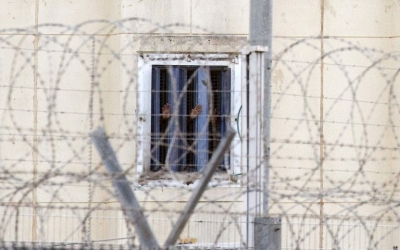
To visit their relatives in prison, Palestinian families must apply for a permit to enter Israel and are regularly denied by Israeli authorities on "security grounds", often with no further explanation. Many prisoners have not seen their families in years.
This has led many detainees to smuggle in cell phones, a reality that prison authorities have been trying to clamp down on for nearly 20 years.
Ali Moghrabi, a spokesperson for the Prisoners Media Office civil society group, told MEE that Israeli authorities began installing jamming devices in 2000.
Recently, however, the manner in which the devices were installed has changed, he said, with equipment put inside prison wings, on prison cell doors and in tight spaces, jamming phone calls as well as TV and radio broadcasts.
Since the gear was first installed in close proximity to the prisoners, detainees have complained of headaches and nausea, Moghrabi added.
“There is an operation to weaken prisoners with these tools that have serious effects international institutions have issued warnings about,” he said.
The spokesperson added that the imposition of jamming devices - with no explanation issued by IPS - comes in the context of broader existing punitive measures taken against the prisoners - measures ranging from limiting access to hot water for showers to decreasing the amount of money they are allowed to receive from their families.
So soon after Israel declared a war on the Palestinian Authority’s payments to prisoners and their families, Palestinian detainees are feeling the pressure. With a hunger strike on the horizon, it remains to be seen how Israeli authorities will respond.
Middle East Eye delivers independent and unrivalled coverage and analysis of the Middle East, North Africa and beyond. To learn more about republishing this content and the associated fees, please fill out this form. More about MEE can be found here.


